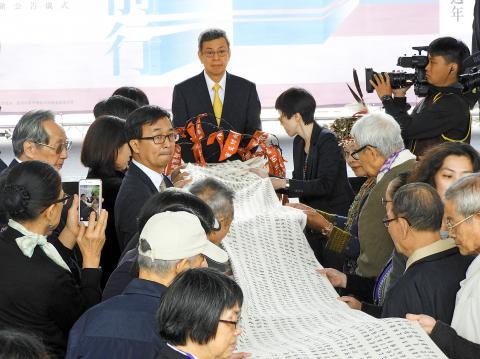The Transitional Justice Commission voted to offer redress for the White Terror era political oppression of Wang Hsi-he (王錫和), and announced that an event would be held on May 31 to officially pardon all victims of the 228 Incident and ensuing Martial Law era.
The 228 Incident refers to a military crackdown by the Chinese Nationalist Party (KMT) regime that began on Feb. 27, 1947. Thousands of people were killed in a series of protests, the majority of whom were social elites and academics.
Wang was involved in the Tseng Fu-li (曾福禮) case stemming from a raid on an alleged communist headquarters, after his colleague, Huang Ke-sheng (黃克繩), passed Wang a note telling him to run, the commission said.

Photo: Chen Yu-fu, Taipei Times
Huang’s note was meant to divert attention from himself after he informed the government that there was a “suspicious group” in a sugar factory in Yujing Township (玉井) in what was then called Tainan County, it said.
However, the Taiwan Garrison Command said that the note was a ruse to obfuscate Huang’s identity as a communist agent and as Wang received the note, it showed that he had “fallen under Huang’s influence,” the commission said, adding that it imprisoned Wang for re-education.
A “communist agent” was defined under the now-defunct Espionage Laws of the Period of the Communist Rebellion (戡亂時期檢肅匪諜條例) as “a traitor, as defined under the Punishment of Rebellion Act (懲治叛亂條例), or one who is in collusion with traitors,” the commission said.
As defined by Article 2 of the punishment act, a traitor is “one actively involved in actual acts of rebellion,” it added.
Huang’s acts violated Article 5, which prohibited joining a rebel organization, and not Article 2, so Huang should not have been considered a traitor, the commission said.
As Huang was not guilty, Wang should also be absolved of any criminal act, it said, adding that according to Huang’s testimony, there was no proof that Wang was a communist spy.
The Taiwan Garrison Command’s ruling that Huang “colluded with traitors” was an overextension of its authority, while its ruling that Wang was under Huang’s influence because they often shopped and exercised together was baseless embellishment, the commission said.
The re-education Wang underwent infringed on his dignity and freedom of thought, it added.
The commission decried the ruling as severely contravening the spirit of democratic government and the principle of a fair trial.
Meanwhile, the commission is to hold a ceremony on May 31 to symbolically pardon all victims from the 228 Incident and the Martial Law era, spokesperson Yeh Hung-ling (葉虹靈) said.
According to the commission’s findings, more than 13,401 people were wrongly or unfairly tried during the period.
The group last year investigated and issued pardons for 2,775 incidents.

A strong continental cold air mass is to bring pollutants to Taiwan from tomorrow, the Ministry of Environment said today, as it issued an “orange” air quality alert for most of the country. All of Taiwan except for Hualien and Taitung counties is to be under an “orange” air quality alert tomorrow, indicating air quality that is unhealthy for sensitive groups. In China, areas from Shandong to Shanghai have been enveloped in haze since Saturday, the ministry said in a news release. Yesterday, hourly concentrations of PM2.5 in these areas ranged from 65 to 160 micrograms per cubic meter (mg/m³), and pollutants were

Taiwan’s armed forces have established response protocols for a wide range of sudden contingencies, including the “Wan Chun Plan” to protect the head of state, the Ministry of Defense (MND) said today. After US President Donald Trump on Saturday launched a series of airstrikes in Venezuela and kidnapped Venezuelan President Nicolas Maduro, concerns have been raised as to whether China would launch a similar “decapitation strike” on Taiwan. The armed forces regularly coordinate with relevant agencies and practice drills to ensure preparedness for a wide range of scenarios, Vice Minister of National Defense Hsu Szu-chien (徐斯儉) told reporters before a

EVA Airways on Saturday said that it had suspended a pilot and opened an investigation after he allegedly lost his temper and punched the first officer several times as their plane was taxiing before takeoff at Los Angeles International Airport. According to a report published on Thursday by The Reporter, the incident occurred after the flight’s Malaysian first officer tried to warn the Taiwanese pilot, surnamed Wen (文), that he was taxiing faster than the speed limit of 30 knots (55.6kph). After alerting the pilot several times without response, the first officer manually applied the brakes in accordance with standard operating

NOT AN OPENING: Trump’s violation of international law does not affect China’s consideration in attacking Taiwan; Beijing lacks capability, not precedent, an official said Taiwanese officials see the US’ capture of the president of Venezuela as a powerful deterrent to Beijing’s aggression and a timely reminder of the US’ ability to defeat militaries equipped with Chinese-made weapons. The strikes that toppled Venezuelan President Nicolas Maduro signaled to authoritarian leaders, including Chinese President Xi Jinping (習近平), US President Donald Trump’s willingness to use military might for international affairs core to US interests, one senior official in Taipei’s security circle said. That reassured Taiwan, the person said. Taipei has also dismissed the idea that Trump’s apparent violation of international law could embolden Beijing, said the official, who was not